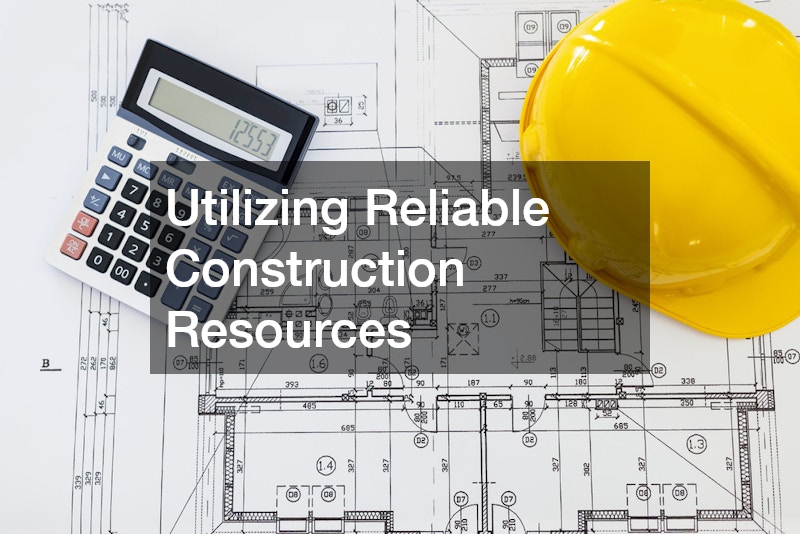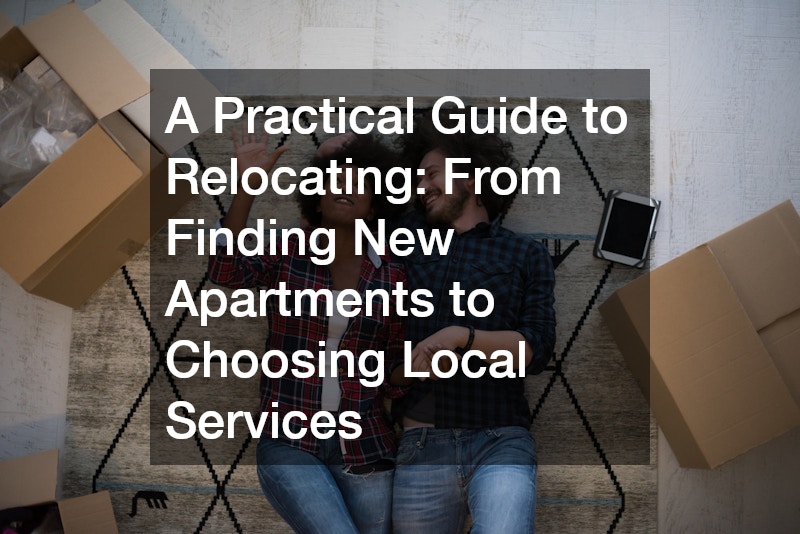Relocating is a major life event that combines the excitement of a fresh start with the challenges of planning, budgeting, and organizing countless details. Whether you are moving across town or to an entirely new city, the process involves more than just packing boxes. Finding the right place to live, arranging the financial aspects, and choosing reliable services are all integral to making the transition smooth. Many people underestimate how many moving parts are involved in a successful relocation. Beyond securing housing, there are considerations like insurance, transportation of goods, demolition or construction needs, and long-term community integration. This guide offers practical advice for individuals and families preparing for this journey, with detailed insights into housing options, financial planning, and essential services that support the moving process. By approaching it with careful planning and an informed mindset, you can avoid many of the pitfalls that cause stress and setbacks. Each section will address an important aspect of this process, providing actionable steps and resources to ensure your move is as seamless and rewarding as possible.
Financing Your Move
One of the first steps when relocating is to assess your financial readiness and understand how you will manage housing costs. For most people, this begins with finding a reliable mortgage lender who can walk you through financing options. Even if you plan to rent rather than purchase a home, exploring mortgage possibilities is a wise step, as it provides insight into your long-term financial health and potential investment opportunities. A reputable lender will explain rates, terms, and how much home you can realistically afford, which reduces stress as you make decisions about where to live. Meeting with financial professionals before moving allows you to set a budget for both immediate expenses and future costs associated with your new home. Beyond housing, financial planning should include moving costs, utility deposits, and emergency savings to cover unexpected challenges. Relocation is a big financial commitment, and having an experienced lender ensures you are well-prepared to manage it effectively. The knowledge gained from these consultations not only helps you in the short term but also sets a strong foundation for your long-term financial stability in your new environment.
Exploring High-End Housing

When relocating to a new city, one of the first housing options many people consider is renting or buying luxury apartments. These spaces often provide not only convenience but also a sense of comfort and prestige. Many luxury complexes offer amenities such as gyms, pools, and on-site maintenance, making them attractive to professionals and families alike. While they may come with higher price tags, these apartments often save residents money and time in other areas, such as commuting and access to amenities. Before signing a lease or purchase agreement, it’s important to tour several properties, compare locations, and assess which features align with your lifestyle needs. During the relocation process, you should also consider the proximity of these apartments to schools, workplaces, and essential services like grocery stores and medical offices. Luxury apartments are particularly appealing for people seeking a modern lifestyle with minimal upkeep, making them an excellent choice for those who want to simplify their living arrangements. As you evaluate housing options, keep in mind how these residences fit within your overall budget and long-term goals.
Considering Alternative Housing Options
For individuals or families who want more flexibility when relocating, modular homes present an increasingly popular option. These homes are built in sections off-site and then transported and assembled at their final location, providing efficiency and customization. Unlike traditional stick-built houses, modular designs allow for a faster timeline from planning to move-in, making them appealing for those who want to settle quickly. They are also often more affordable than traditional housing, without sacrificing quality or comfort. Many builders offer a wide range of floor plans, giving families the ability to choose layouts that suit their preferences and needs. Modular homes can also be energy-efficient, incorporating modern insulation and construction techniques to keep utility costs low. As relocation continues to grow more complex and expensive in many regions, these homes represent a practical and forward-thinking choice. Exploring this option ensures you don’t overlook an affordable and adaptable housing type that could provide you with the right balance of cost savings and customization as you transition into a new community.
Exploring Land Development Opportunities

Relocating sometimes involves building a home from the ground up, which may include seeking out build to suit land. This option allows you to design a home that fits your exact needs, from square footage to room layout, while also giving you the freedom to select features that reflect your style. Choosing the right piece of land is an important decision, as factors like zoning, soil quality, and access to utilities will directly impact the building process. Working with professionals such as surveyors and builders is essential to ensure the land can support your goals. One advantage of building on your own land is the ability to select a location that fits your long-term lifestyle, whether that means rural tranquility or suburban convenience. While this process can take more time than renting or buying an existing property, it gives you control over every aspect of your future home. When moving, exploring land development ensures you are not limited to preexisting options, but instead have the opportunity to create a custom living environment tailored to your personal vision.
Securing Essential Supplies
When preparing for relocation, another crucial factor to consider is access to a reliable building supply store. Even if you are moving into a finished property, there are often small projects or adjustments that require materials, tools, and equipment. These stores are invaluable resources for both homeowners and renters, as they provide everything from paint and flooring to hardware and fixtures. Having a trusted supplier nearby can save you time, money, and stress when unexpected repairs or upgrades arise. For those building a new home or customizing an existing one, these stores become even more important, offering bulk supplies and expert advice. As you settle into your new area, building supply stores also serve as community hubs where you can connect with local contractors and service providers. Relocating involves more than just unpacking; it often includes making a new house feel like home. Reliable access to supplies ensures you can make those adjustments quickly and efficiently, giving you the confidence to handle both small tasks and larger projects without unnecessary delays.
Finding Modern Rental Choices

For many individuals, moving is a perfect opportunity to start fresh in a modern, low-maintenance property. Choosing new apartments can provide the peace of mind that comes with updated construction, modern amenities, and efficient layouts. These properties often come with energy-efficient appliances, better insulation, and smart-home technology that makes day-to-day living easier. They also typically include warranties or maintenance agreements that reduce the burden of unexpected repairs. Families and professionals often prefer new apartments because they are move-in ready, requiring little to no customization to feel comfortable. When evaluating your options, it’s helpful to consider not only the features of the apartment itself but also its location relative to schools, shopping, and employment opportunities. New developments are often situated in growing communities, which means they may offer long-term value as the surrounding area becomes more established. By carefully evaluating new apartments during the relocation process, you can ensure your new home provides the convenience, comfort, and efficiency needed for a smooth transition into a new community.
Choosing Reliable Moving Support
One of the most overlooked aspects of relocation is the need for dependable local moving services. These companies provide more than just transportation; they offer peace of mind by ensuring that your belongings are handled carefully and arrive on time. Local movers understand the logistics of the area, from navigating traffic patterns to coordinating with building management, which makes them particularly valuable for urban relocations. They often provide packing supplies, storage options, and even unpacking assistance to reduce the stress of moving day. By working with local professionals, you also support community businesses and build relationships that can be useful as you settle in. The process of relocating is often stressful, but partnering with reliable movers allows you to focus on other priorities like adjusting to your new neighborhood and setting up utilities. Carefully vetting and selecting a trusted provider ensures your move is as smooth and efficient as possible, helping you avoid common pitfalls and delays associated with DIY moving.
Preparing Properties for Transition
In some cases, relocation involves preparing an old property for sale or renovation, which can require professional demolition services. These services are essential when removing outdated structures, unsafe buildings, or features that no longer serve your needs. Skilled demolition professionals know how to handle hazardous materials, manage debris removal, and ensure compliance with local regulations. Whether you’re clearing space for new construction or making way for property improvements, safe and efficient demolition is a critical step. Attempting to do this work without expert help can be dangerous and costly, making professional services the more reliable option. As part of the relocation process, scheduling a timely demolition ensures that your property transitions smoothly into its next phase of use. This preparation not only enhances the value of your real estate but also ensures that future projects can move forward without unnecessary obstacles. By including demolition services in your relocation plan, you safeguard both your timeline and your long-term investment.
Utilizing Reliable Construction Resources

Another vital aspect of relocating is ensuring you have access to quality construction products for any renovations, repairs, or customizations. From lumber and drywall to roofing and insulation, having the right materials on hand makes all the difference when transforming a house into a home. Reputable suppliers can provide products that meet safety and efficiency standards, ensuring your upgrades are built to last. For larger projects, bulk orders can be coordinated with contractors to save money and streamline delivery. Even smaller DIY improvements, such as updating cabinets or installing new flooring, benefit from reliable materials. Construction products are often the backbone of any project, and choosing high-quality options reduces the risk of future issues. As part of the relocation process, establishing connections with local suppliers ensures you are never left without the resources you need. This step also familiarizes you with the broader construction community in your new area, opening opportunities for future collaborations and home improvement projects.
Protecting Your New Investment
After all the planning, moving, and settling in, one of the final but most important steps when moving is securing coverage through a local insurance agent. Insurance protects your property, belongings, and financial well-being against unexpected events such as natural disasters, theft, or accidents. Working with a local agent ensures that you receive personalized service and guidance tailored to your area’s specific risks. They understand local weather patterns, building codes, and neighborhood concerns, making them uniquely positioned to advise you on the best coverage options. Unlike generic online providers, local agents can provide face-to-face consultations and support when you need it most. Building a relationship with an insurance professional also creates long-term peace of mind, knowing that your investment is safeguarded. By addressing this crucial step, you can enjoy your new home without constant worry about potential risks. Incorporating insurance into your relocation plan ensures you start this new chapter with the protection and confidence you deserve.
Relocating is a complex journey that requires careful planning, reliable services, and thoughtful decision-making. From securing financing and choosing housing to arranging moving support and protecting your investment, every step plays a role in ensuring your success. Ultimately, relocating is not just about moving belongings from one place to another—it’s about creating a stable, comfortable, and rewarding environment for the future. With the right resources and strategies, you can transform the challenges of moving into opportunities for growth, stability, and renewed purpose. This practical guide serves as a roadmap, helping you navigate each step with confidence and clarity as you begin your next adventure.





